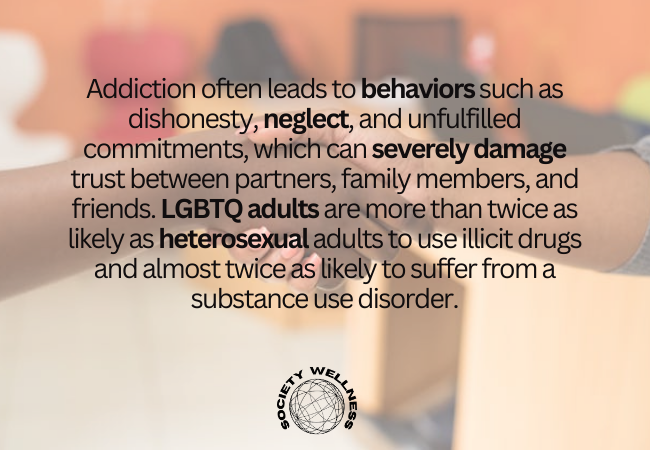Rebuilding trust after addiction is one of the most challenging but rewarding aspects of recovery. For LGBTQ individuals, the journey to regaining trust can be uniquely complex, shaped by factors like societal stigma, family dynamics, and the emotional toll of addiction. At LGBTQ Addiction Centers, we understand the intricacies of this process and offer specialized care through our LGBTQ Addiction Treatment Programs and LGBTQ Substance Abuse Treatment to support recovery and relationship repair.
How Addiction Breaks Trust
Addiction profoundly affects relationships, often leading to broken trust that takes significant effort to rebuild. Trust is the foundation of healthy interactions, and addiction erodes it through behaviors that prioritize substance use over honesty, reliability, and emotional connections.
Key Ways Addiction Breaks Trust:
- Deception and Lies:
- Addiction often drives individuals to hide their substance use, leading to frequent dishonesty about where they’ve been, how they spend money, or why they missed important obligations.
- Loved ones may feel betrayed and question whether they can believe anything the individual says.
- Unkept Promises:
- Commitments to quit using substances, attend events, or fulfill responsibilities are often broken, leaving family and friends feeling disappointed and hurt.
- Over time, this pattern diminishes the credibility of the individual struggling with addiction.
- Neglect of Relationships:
- Substance use becomes the primary focus, often at the expense of relationships.
- Loved ones may feel abandoned or unimportant as addiction takes precedence over spending time together or meeting emotional needs.
- Behavioral Changes:
- Addiction can lead to mood swings, aggression, or withdrawal, making it difficult for loved ones to feel emotionally safe or connected.
- These changes can create a sense of instability and unpredictability in relationships.
The Importance of Rebuilding Trust After Addiction
Rebuilding trust after addiction isn’t just about mending relationships with others—it’s about rebuilding trust in yourself. Addiction often creates cycles of broken promises, deceptive behaviors, and emotional withdrawal, leaving loved ones feeling betrayed. For LGBTQ individuals, this process can be further complicated by issues such as discrimination, lack of acceptance, or strained family relationships.
Why Rebuilding Trust Matters:
- Trust is essential for emotional intimacy and mutual respect in relationships.
- It lays the foundation for a supportive recovery network.
- For LGBTQ individuals, rebuilding trust can also involve repairing relationships with family or chosen family and addressing personal feelings of worthiness and self-respect.
Understanding the Impact of Addiction on Relationships
Addiction affects relationships in profound ways, often leading to damaged trust, emotional strain, and broken communication.
How Addiction Erodes Trust
- Broken Promises: Addiction often leads to unfulfilled commitments, causing loved ones to feel let down.
- Dishonesty: Individuals may lie about their substance use to avoid judgment or consequences.
- Neglect of Relationships: Addiction prioritizes substance use over family, friends, and other responsibilities.
The Unique Challenges for LGBTQ Individuals
- Stigma and Isolation: LGBTQ individuals may already face rejection or misunderstanding, intensifying the emotional fallout of addiction.
- Family Dynamics: Strained relationships with unsupportive family members can complicate the recovery process.
- Identity Challenges: Internalized shame or discrimination may compound feelings of guilt and hinder relationship repair.
Steps to Rebuild Trust After Addiction
Rebuilding trust takes time, consistency, and effort. Here are key steps to guide the process:
Step 1: Acknowledge the Damage Caused
- Take full responsibility for the impact of your addiction on relationships.
- Avoid blaming others or external circumstances; focus on your role in the situation.
- For LGBTQ individuals, this may also involve addressing feelings of guilt or shame tied to identity and substance use.
Step 2: Commit to Honesty and Transparency
- Be truthful about your recovery process, including setbacks or challenges.
- Share your goals and progress openly with loved ones to rebuild confidence in your actions.
- Transparency is especially important in rebuilding trust within LGBTQ support networks, where mutual understanding is key.
Step 3: Demonstrate Consistent Actions Over Time
- Follow through on promises, no matter how small.
- Build a track record of reliability by showing up for important moments and prioritizing others’ needs.
- Actions speak louder than words, especially when trying to repair relationships damaged by addiction.
Step 4: Actively Participate in LGBTQ Addiction Treatment Programs
- Enroll in LGBTQ Substance Abuse Treatment to address the underlying causes of addiction.
- Family therapy can help mend relationships by fostering open communication and understanding.
- Engaging in recovery programs demonstrates a commitment to change, helping to rebuild trust.
Step 5: Apologize and Make Amends
- Offer sincere apologies to those affected by your addiction, acknowledging specific harms caused.
- Make amends where possible, whether through direct actions or symbolic gestures of reconciliation.
The Role of Therapy in Rebuilding Trust
Therapy plays a crucial role in addressing the emotional and relational impacts of addiction.
Individual Therapy
- Focuses on understanding personal triggers and patterns that contributed to addiction.
- Helps rebuild self-trust and develop healthier coping mechanisms.
Family Therapy
- Creates a safe space to address misunderstandings, rebuild communication, and foster empathy.
- LGBTQ Mental Health Programs provide additional support to families navigating issues of identity and acceptance.
How Support Groups Can Help Foster Trust
Support groups provide a unique opportunity to connect with others who share similar experiences, fostering accountability and mutual encouragement.
Benefits of Peer Support
- Share your journey with individuals who understand the complexities of LGBTQ Substance Abuse.
- Learn from others’ experiences, gaining insights into how they rebuilt trust after addiction.
Building a Support Network
- LGBTQ-specific support groups create a sense of belonging and reduce isolation.
- Group therapy sessions at LGBTQ Addiction Centers strengthen interpersonal skills and reinforce recovery goals.
Challenges in Rebuilding Trust and How to Overcome Them
Rebuilding trust is not a linear process. It requires patience, resilience, and a willingness to navigate setbacks.
Common Challenges
- Skepticism from Loved Ones: It’s natural for others to be cautious, especially if past promises were broken.
- Managing Relapse: If a relapse occurs, honesty and accountability are crucial to regaining trust.
- Internal Struggles: Overcoming self-doubt and guilt is necessary to rebuild trust in oneself.
Strategies to Overcome Challenges
- Focus on consistent, positive actions to rebuild confidence in your recovery.
- Use therapy and support groups to process setbacks and reinforce progress.
- Engage with programs at an LGBTQ Rehab Center to ensure you’re receiving affirming care that addresses your unique needs.
The Long-Term Benefits of Rebuilding Trust
Rebuilding trust after addiction is a transformative process with far-reaching benefits that extend beyond the individual. For LGBTQ individuals, this journey often leads to a stronger sense of self, healthier relationships, and a more supportive community.
Personal Benefits of Restored Trust:
- Renewed Self-Confidence:
- Restoring trust in oneself fosters a sense of empowerment and resilience.
- As individuals demonstrate reliability and honesty, they regain belief in their ability to overcome challenges.
- Improved Emotional Well-Being:
- Rebuilding trust reduces feelings of guilt and shame, replacing them with pride in one’s recovery journey.
- The emotional stability gained through mended relationships contributes to overall mental health.
How Professional Support Accelerates the Process
Rebuilding trust after addiction is a complex journey, but professional support can make it more structured, effective, and inclusive. Specialized care, such as that provided at LGBTQ Addiction Centers, equips individuals with the tools and guidance needed to rebuild both personal and relational trust.
Key Ways Professional Support Helps:
- Therapeutic Frameworks:
- Individual Therapy: Addresses the root causes of addiction, such as trauma, stress, or identity struggles, helping individuals understand their behaviors and regain self-trust.
- Family Therapy: Creates a safe environment for open communication, allowing loved ones to express their feelings and rebuild emotional connections.
- Evidence-Based Strategies:
- Programs like Cognitive Behavioral Therapy (CBT) and Motivational Interviewing teach practical skills for honesty, accountability, and emotional regulation.
- Trauma-informed care is particularly valuable for LGBTQ individuals who have faced discrimination or rejection.
- LGBTQ-Inclusive Care:
- LGBTQ-specific addiction treatment programs provide a judgment-free space to explore identity-related challenges and their impact on relationships.
- Therapists trained in LGBTQ issues understand the nuances of chosen families, societal stigma, and co-occurring mental health conditions.
- Peer Support Networks:
- Group therapy and LGBTQ-focused support groups offer a sense of belonging and shared understanding.
- Hearing how others in similar situations have rebuilt trust inspires hope and provides actionable insights.
- Accountability and Relapse Prevention:
- Ongoing support ensures individuals stay committed to their recovery, which is critical for rebuilding trust.
- Aftercare programs provide structure and resources to maintain progress and avoid setbacks.
Conclusion
Rebuilding trust after addiction is a gradual process that requires honesty, effort, and patience. For LGBTQ individuals, finding inclusive and affirming care is critical to overcoming the unique challenges of this journey. At LGBTQ Addiction Centers, we provide compassionate support through LGBTQ Addiction Treatment Programs, LGBTQ Mental Health Programs, and specialized care tailored to your needs.
Take the first step toward healing today. Contact our LGBTQ Rehab Center to begin your journey to recovery and stronger relationships. Together, we can help you reclaim your life and rebuild trust in yourself and those around you. Reach out to us at (888) 598-9510 to learn more about our specialized programs and how we can support your journey to recovery.
FAQ on Rebuild Trust After Addiction
How does addiction break trust in relationships?
Addiction breaks trust by causing dishonesty, neglect, and unkept promises. These behaviors often leave loved ones feeling betrayed, abandoned, and unsure of the individual’s reliability.
Why is professional support important for rebuilding trust after addiction?
Professional support provides structured therapy, accountability, and tools to address the root causes of addiction. LGBTQ-specific programs ensure a safe and affirming environment for individuals to heal and rebuild relationships.
How can LGBTQ-focused addiction programs help in rebuilding trust?
LGBTQ-focused programs address unique challenges such as societal stigma, family rejection, and mental health concerns. They offer inclusive care tailored to the specific needs of LGBTQ individuals and their chosen families.
What are the long-term benefits of rebuilding trust after addiction?
Restored trust fosters stronger relationships, renewed self-confidence, and emotional well-being. It also strengthens support networks and helps individuals feel connected to their community.
How can family therapy help rebuild trust?
Family therapy creates a safe space for open communication, understanding, and setting new boundaries. It helps repair relationships damaged by addiction and fosters a supportive recovery environment.

